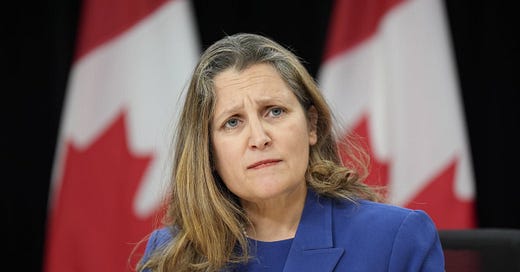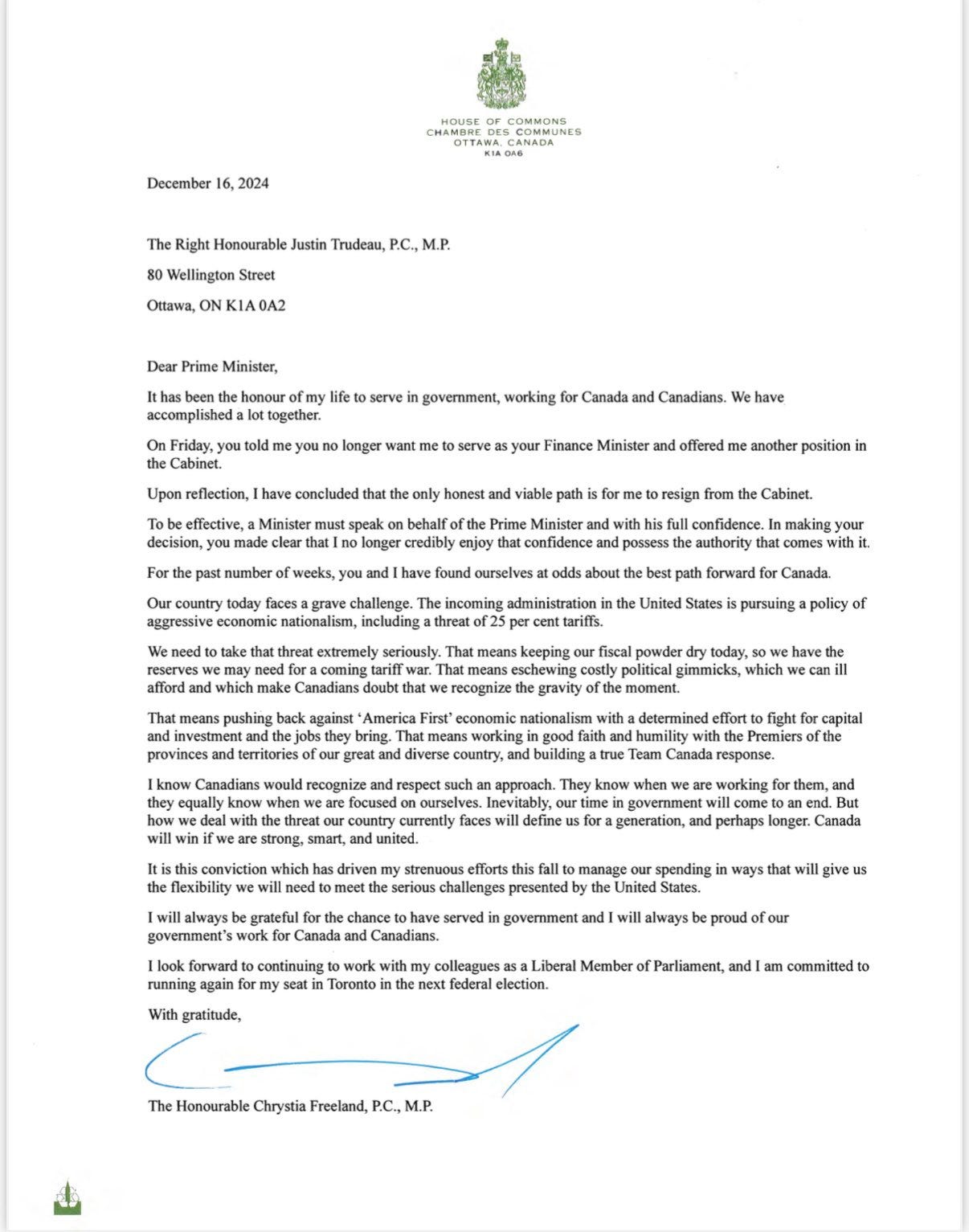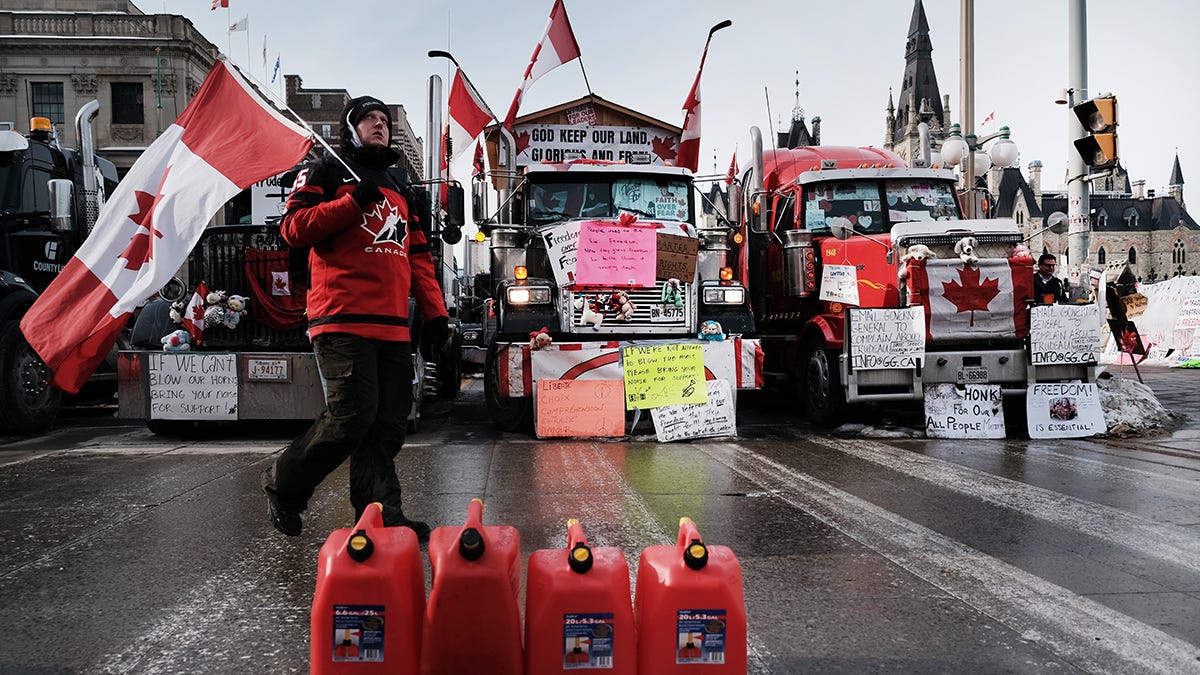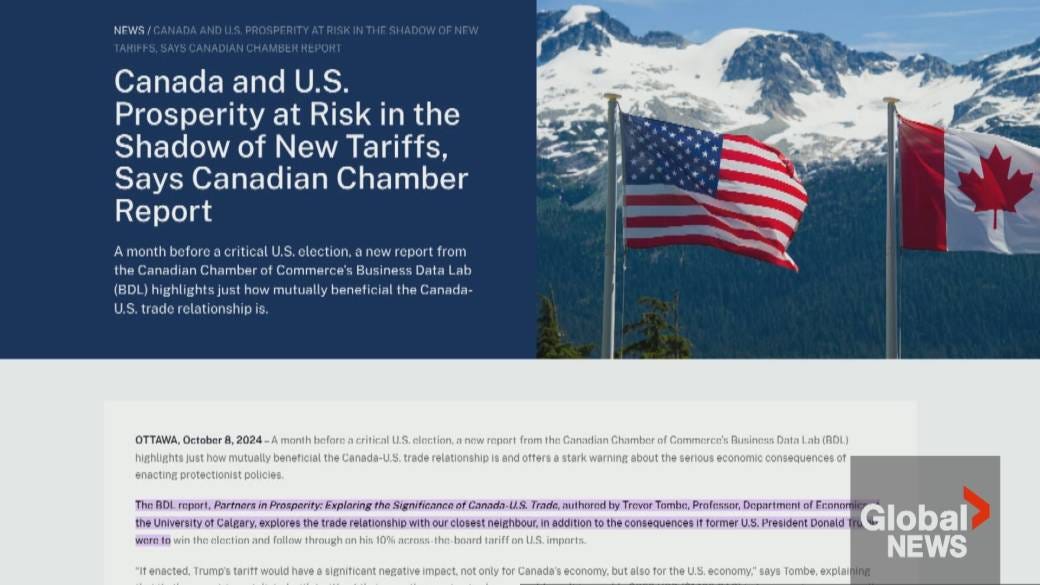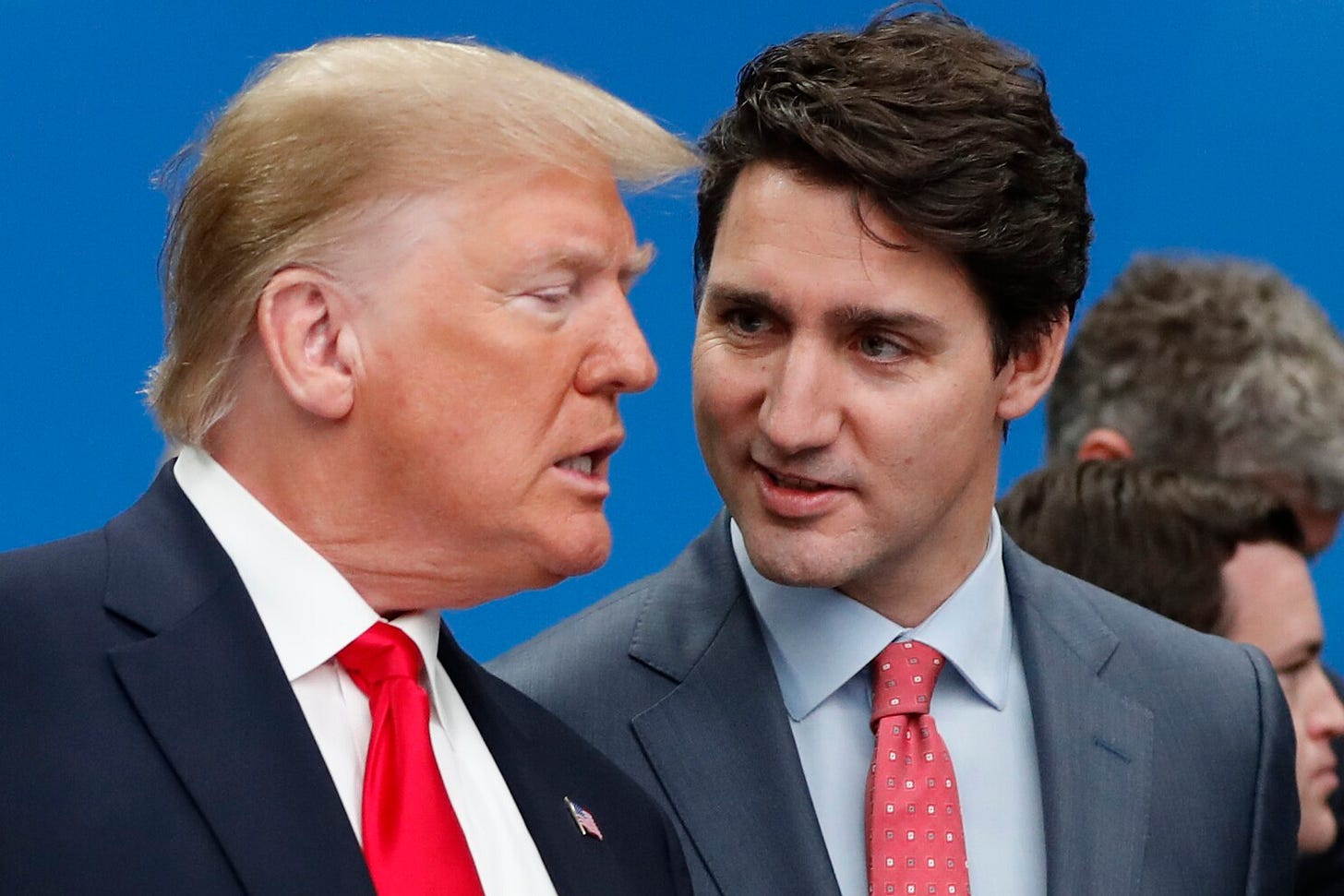"Chrystia Freeland Resigns: Trudeau Government in Turmoil as Unpopular Finance Minister Steps Down"
Canadian Finance Minister Chrystia Freeland Resigns Amid Political and Economic Turmoil
In a bombshell revelation from Redacted, one of the best independent journalism sources, Canadian Finance Minister Chrystia Freeland has officially resigned, sending shockwaves through Canadian politics. The letter she wrote to Prime Minister Justin Trudeau signals a sharp break, with Freeland showing a clear loss of confidence in Trudeau’s leadership. This resignation comes amid a heated fight over tariffs with incoming U.S. President Donald Trump, raising serious concerns about Canada’s economic stability. Freeland’s departure is particularly noteworthy given her role in previous controversies, such as her stance during the trucker convoy protests and COVID-19 restrictions. As Natali Morris noted, “She is the same Freeland who was laughing and joking around about freezing the bank accounts of the trucker convoy in all of the COVID restrictions and lockdowns.”
Canadian journalist David Krayden, who has been extensively covering the unfolding events, described Freeland’s resignation as unprecedented. Krayden explained, “I wasn’t surprised she left… I was expecting her to deliver the fall economic statement today and then be fired by Justin Trudeau.” Instead, Freeland outmaneuvered Trudeau by announcing her resignation publicly early on Monday morning. According to Krayden, this move caught the Prime Minister off guard. “She’s really outfoxed Trudeau because this letter comes out publicly… She announces, ‘Hey, I’m not the Finance Minister anymore, you’re on your own Justin.’” Krayden added that her letter was extraordinarily critical, adopting language typically used by opposition leader Pierre Poilievre. Freeland referred to Trudeau’s “economic gimmicks,” including the GST holiday and a $250 check being sent to Canadians, saying she could no longer justify the growing deficit, which has already exceeded $40 billion.
Chrystia Freeland's Controversial Actions and Policies That Angered Canadians
Chrystia Freeland’s tenure as Finance Minister and Deputy Prime Minister was marked by a series of decisions and policies that drew sharp criticism from many Canadians. Among the most notorious was her handling of the trucker convoy protests during the COVID-19 lockdowns. Freeland played a central role in the Trudeau government’s decision to invoke the Emergencies Act, which led to the freezing of bank accounts belonging to protesters and supporters. This move was widely criticized as authoritarian and an overreach of government power. During the interview, Natali Morris reminded the audience of Freeland’s dismissive attitude during the crackdown, saying, “She is the same Freeland who was laughing and joking around about freezing the bank accounts of the trucker convoy in all of the COVID restrictions and lockdowns.”
Freeland’s economic policies also sparked anger across Canada. Her support for aggressive deficit spending has been a source of frustration, particularly as Canada’s national deficit ballooned beyond $40 billion under her watch. Many Canadians viewed these spending initiatives, such as the GST holiday and free $250 checks, as superficial “economic gimmicks” that failed to address real economic challenges. As David Krayden pointed out, Freeland’s resignation letter itself criticized these policies, highlighting that she could no longer justify “spend[ing] more money that we don’t have.” This reckless fiscal approach, combined with rising inflation and cost-of-living pressures, left many Canadians disillusioned with Freeland’s leadership and her ability to manage the country’s finances.
In addition, Freeland's political demeanor and public statements often contributed to her unpopularity. Critics accused her of being tone-deaf to the struggles of everyday Canadians, particularly during the pandemic. Krayden noted that Freeland’s exit reflected the broader sentiment that her tenure had caused significant damage to the Trudeau government. Her controversial decisions—especially those that expanded government control and added economic strain—were among the key reasons she lost public and political support. Freeland’s departure now leaves behind a legacy of policies that many Canadians viewed as divisive, ineffective, and, in some cases, draconian.
Chrystia Freeland’s Resignation Letter and Its Implications
The tone of Freeland’s resignation letter stunned observers. As Krayden pointed out, the letter goes beyond a typical cabinet resignation and is deeply critical of Trudeau’s policies and leadership style. “This letter is so caustic… I’ve never seen a federal cabinet minister resign and write a note like this to the sitting prime minister.” Freeland’s departure highlights a fundamental rift within the Liberal Party, with Krayden describing her stance as “unprecedented in Canadian history.” Freeland also criticized Trudeau’s deficit spending and economic handling, indicating a deep frustration with his inability to manage the country’s finances responsibly.
One of the key questions raised in the interview was whether Freeland resigned voluntarily or was pressured to leave. According to Krayden, “She has outfoxed Trudeau… She says in the letter that Trudeau told her on Friday, ‘I want you gone as Finance Minister.’” However, Freeland refused to play along with Trudeau’s strategy, rejecting another cabinet position and instead choosing to leave entirely. Krayden suggested that her decision to publicly defy Trudeau and declare her intent to run in the next federal election was a significant political maneuver. “Almost like she’s saying, ‘Let’s have it, let’s have another federal election.’”
The Trudeau Government, Tariffs, and Canada-U.S. Trade Tensions
A significant backdrop to Freeland’s resignation is the mounting tension between Canada and the United States over incoming President Donald Trump’s proposed 25% tariffs. Krayden pointed out that Freeland’s letter emphasized the need for a “Team Canada” approach, which she implied Trudeau has failed to deliver. “She’s talking about a real Canada-first or a real Team Canada policy… It’s a Trudeau team policy, not a Team Canada policy.” According to Krayden, Trudeau is working primarily with Ontario Premier Doug Ford while ignoring other provincial leaders, including Alberta Premier Danielle Smith and Quebec’s leadership. This division, Krayden argues, exacerbates Canada’s vulnerability in trade negotiations with the U.S.
Krayden further claimed that Trudeau is deliberately inviting a trade war with the United States. “Justin Trudeau wants a trade war… It’s the only thing that might save his job if he can convince Canadians it’s Trudeau against Donald Trump, that evil Donald Trump.” This strategy, he explained, may be Trudeau’s last attempt to rally national support. Krayden described it as “delusional,” pointing out that such a conflict would have devastating consequences for Canada’s economy.
What’s Next for Trudeau and Canadian Politics?
The interview also explored what Freeland’s resignation means for Trudeau’s political future. According to Krayden, there is a growing consensus within the Liberal Party that Trudeau’s leadership lacks legitimacy and validity. “Even former Liberal cabinet ministers are coming out and saying we need elections.” Krayden emphasized the urgency of the situation, suggesting that Canada needs a new government capable of handling trade relations with the incoming Trump administration. “There’s not enough time now to just say, ‘Well, we’ll wait it out.’ Donald Trump will be here on January 20th, 2025.”
Krayden further speculated that a federal election before Christmas is a distinct possibility. “This very historic occurrence today of a Finance Minister resigning… is unprecedented in Canadian history.” He noted that Freeland’s resignation, combined with the departure of Trudeau’s housing minister on the same day, reflects a government in deep crisis. Krayden argued that Trudeau’s era is coming to an end, saying Freeland’s letter implicitly calls for his resignation. “She said everything in that letter except, ‘Resign today just like I did.’”
Conclusion: A Government on the Brink
The interview concluded with both hosts and Krayden agreeing that Trudeau’s government is on shaky ground. Krayden highlighted the Liberal Party’s sense of hopelessness, stating that no one within the party views Freeland’s resignation as a strategic move that benefits Trudeau. He also questioned Freeland’s state of health and ability to navigate these political challenges, observing that she often struggles to respond to questions promptly. “Chrystia Freeland looks like a woman who has serious health issues right now.”
The overall tone of the interview reflected a deep skepticism about Trudeau’s leadership and the direction of the Canadian government. As David Krayden put it, “It’s over for Justin Trudeau. This is a pipe dream. This is delusional.” With a fiscal crisis looming and Canada-U.S. relations at risk, the Trudeau government faces what could be its final weeks in power. Whether a federal election occurs before Christmas remains to be seen, but as Krayden predicted, “It’s going to be a crazy Christmas up there in Canada.”
Thank You for Support
We want to take a moment to thank you for reading and supporting our coverage. At Financial Anarchy, we strive to bring you the most relevant, accurate, and timely financial and political information that mainstream media often overlooks. Your engagement helps us continue to shed light on the stories that matter most to you, stories like this one about Chrystia Freeland's resignation and its far-reaching implications.
If you found this article insightful, we kindly ask you to like, subscribe, and share it with others. By spreading the word, you’re helping us reach more people who value honest reporting and transparent analysis.
We are entirely supported by our viewers, and your contributions make this work possible. If you’d like to help us continue producing content that informs and empowers, please consider making a donation. Every dollar goes directly toward funding the research, reporting, and resources needed to deliver the truth without compromise.
Thank you for being part of our growing community. Together, we can continue to challenge narratives, hold leaders accountable, and bring you the stories that shape our world.


